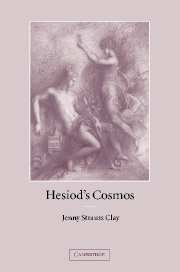Book contents
- Frontmatter
- Contents
- Preface
- Acknowledgments
- List of abbreviations
- Introduction
- 1 Orientations: the Theogony
- 2 Orientations: the Works and Days
- 3 Overtures
- 4 The origins and nature of mankind
- 5 The two Prometheuses
- 6 Perspectives on gods and men
- 7 Hybrids
- Conclusion: Hesiod and Calchas at Aulis
- Bibliography
- Indexes
4 - The origins and nature of mankind
Published online by Cambridge University Press: 04 August 2010
- Frontmatter
- Contents
- Preface
- Acknowledgments
- List of abbreviations
- Introduction
- 1 Orientations: the Theogony
- 2 Orientations: the Works and Days
- 3 Overtures
- 4 The origins and nature of mankind
- 5 The two Prometheuses
- 6 Perspectives on gods and men
- 7 Hybrids
- Conclusion: Hesiod and Calchas at Aulis
- Bibliography
- Indexes
Summary
As I have tried to demonstrate, from its beginning, the Theogony opens an Olympian perspective on the cosmos. Human beings, ephemeral creatures that they are, are necessarily confined to its margins. To study the origins and nature of mankind in Hesiod, we must, at least temporarily, turn our backs on the heights of Olympus and return to the more terrestrial level of the Works and Days, where the origins of mankind constitute the focus of Hesiod's myth of the five races.
Hesiod's account of the progressive decline of the human race, symbolized by the succession of metals, from the paradisiacal race of gold to our wretched age of iron may ultimately derive from Near Eastern or Indo-European traditions. But Hesiod's version substantially modifies what was originally a straightforward pattern of decline. For one thing, the decline is dramatically arrested by the insertion of the race of heroes, for which there appear no Oriental parallels, between the race of bronze and the iron race. Most scholars explain the inclusion of the heroes by the practical necessity of incorporating these legendary figures who play such an important role in Greek mythology. But in his influential interpretation, Vernant forcefully demonstrated that the presence of the heroes is not simply due to the pressure of tradition. In fact, their presence radically changes the structure and hence the meaning of the myth.
- Type
- Chapter
- Information
- Hesiod's Cosmos , pp. 81 - 99Publisher: Cambridge University PressPrint publication year: 2003

